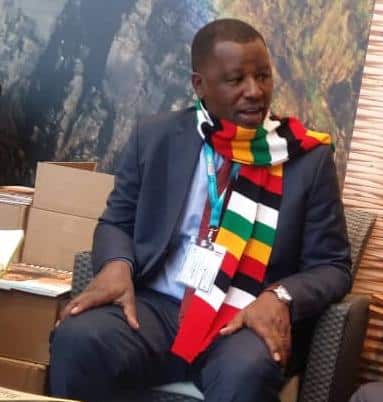The International Tourism Bourse trade show currently underway in Berlin, Germany, has set the right tone for Zimbabwe to expand its horizon and lure strong visitor traffic this year. The Southern African state is offering massive tourism investment opportunities to international markets as it seeks to tap into the deep pool of key European markets such as hosts Germany.
Ministry of Environment, Tourism and Hospitality Industry, Permanent Secretary, Munesu Munodawafa, outlined lucrative opportunities in resorts such as Victoria Falls as well as opportunities for capital projects in Tugwi Mukosi.
“We are targeting a lot of investments in the tourism sector. We are coming almost to an optimum in terms of room occupancy, so investments in accommodation becomes key. We need to investment in building more lodges and hotels. We have plenty of leisure areas but we need our own entrepreneurs to come on board and invest as well. I would like to appeal to Zimbabweans to identify these spots and try to then invite potential foreign partners for engagement,” he said.
Zimbabwe is currently enjoying positive sentiments by investors from the world’s second largest economy China. The Chinese are eyeing massive capital projects in Victoria Falls special zone. There is also huge project currently underway in the world heritage site which is set to translate Zimbabwe into Grand Prix host upon completion.
According to Munodawafa, opportunities are also abundant in leisure and cultural products. “In Victoria falls we have that land 1200 hectares ready for investment. In Tugwi Mukosi, we have opportunities for investments for a world class golf course, and these are projects that will push Zimbabwean tourism to even greater heights.”
Government has put in place a number of incentives for the potential investors in this sector, among these leveraging on the special economic zones status that will provide investors with attractive packages as incentives.
In terms of the fiscal incentives that were gazetted in the Finance Act of 2017, there is zero-rated corporate income tax for the first five years of operation with a corporate tax rate of 15 percent applying thereafter; there is also a duty-free importation on capital equipment.
Other fiscal incentives include a special initial allowance of 50 percent of cost from year one and 25 percent in the subsequent two years; exemption from non-residents tax on fees for services that are not locally available; exemption from non-residents tax on fees for services that are not locally available, and zero-rated capital gains tax, among others.
Lauded as a low hanging fruit, tourism is a critical plinth for Zimbabwe to record quick wins on its economic resurgence drive. The 2019 National Budget identifies tourism as a pivotal pillar to earn the country foreign currency receipts, with treasury emphasising that the sector can grow its contribution to the Gross Domestic Product to at least 20 percent.
The sector continues to record a positive trajectory after clocking 2,4 million arrivals last year translating to over 1 billion dollars in earned receipts. The target is to grow this arrival base with a strong focus on key markets such as Germany projected to improve with a 15 percent margin, as well as other markets such as the United States and the United Kingdom which continue to push figures on international arrivals.






